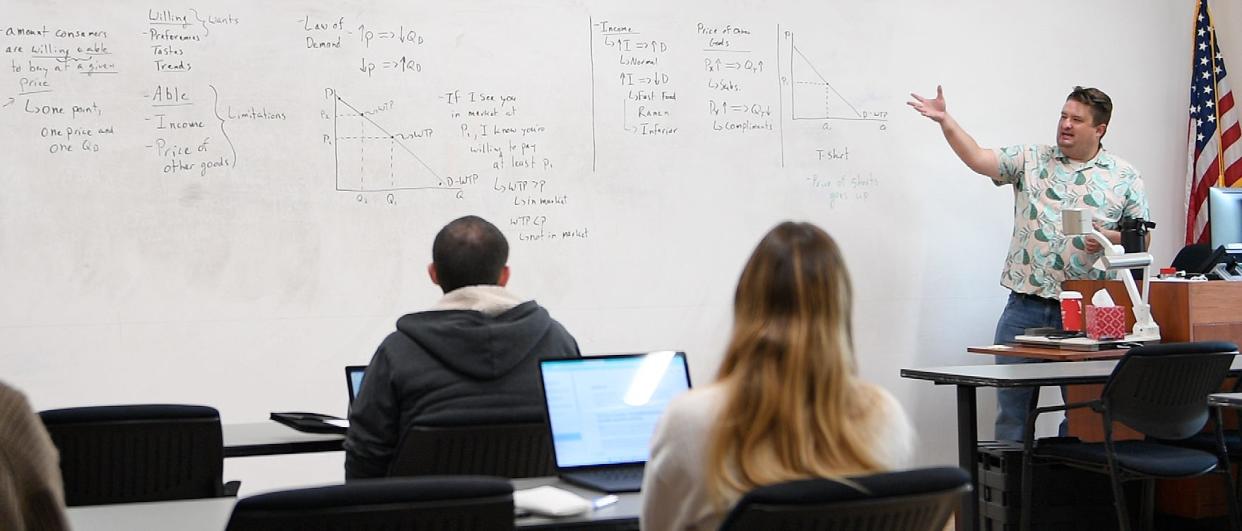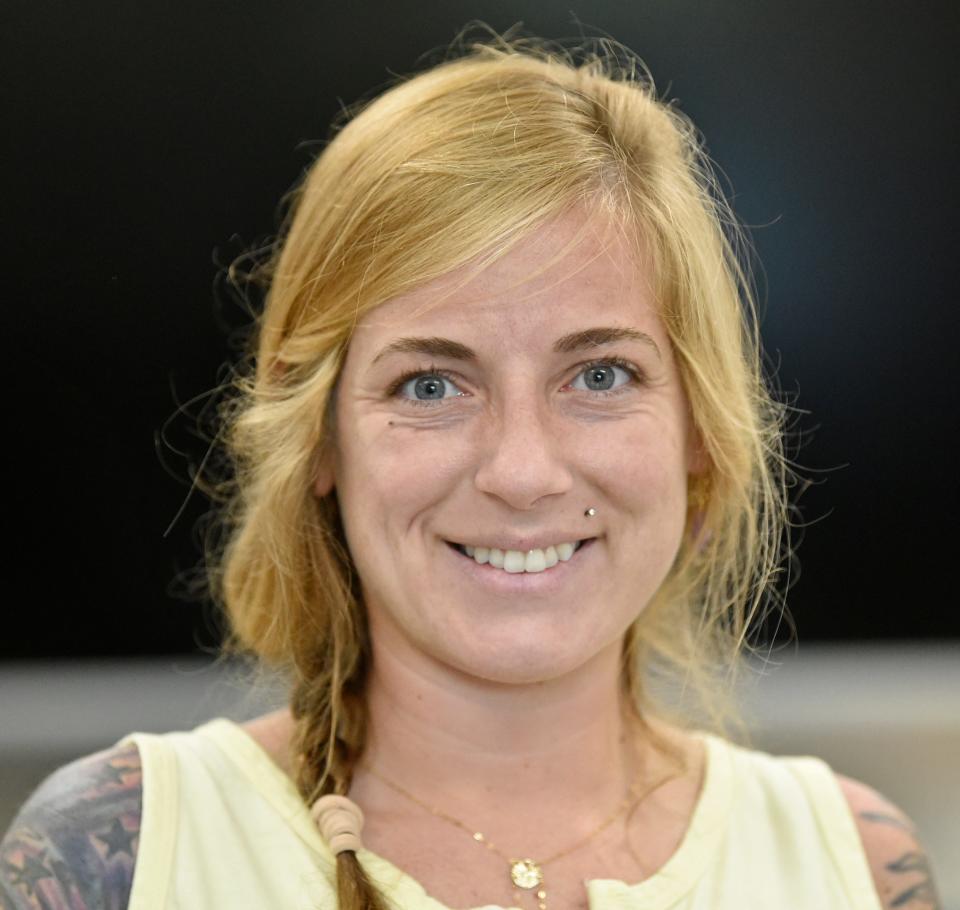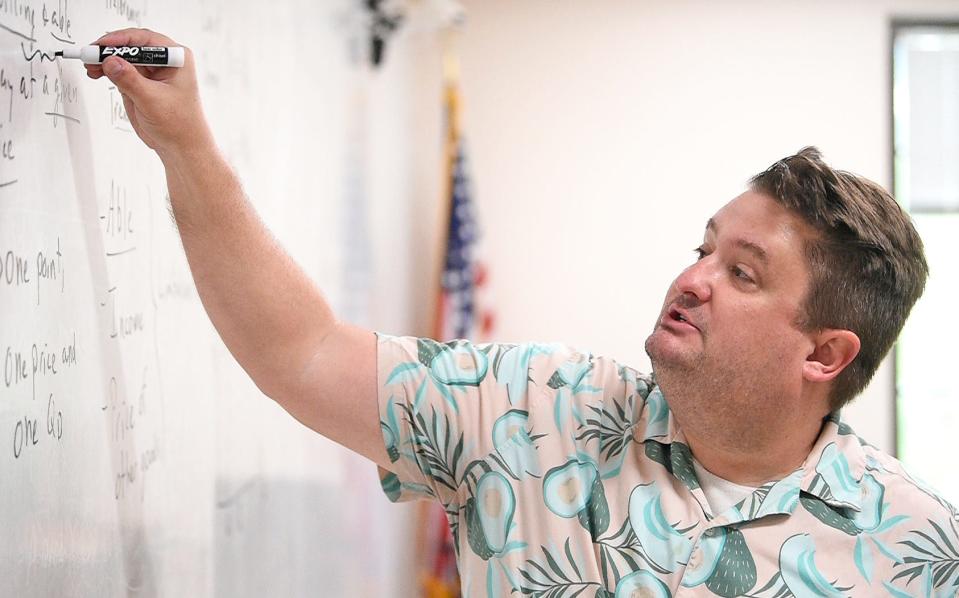Debt taken on at young age affects life choices, with some relief on the way

SARASOTA — Licensed financial consultant and mother Kaveecia Moore is a "by-product" of the Great Recession, having earned her undergraduate degree more than a decade ago as the economy was imploding.
At a time of high unemployment, she decided to return to school and earned her MBA, while also acquiring six figures in student loan debt.
Today, that lingering debt is a major reason she has yet to become a homeowner.
“I came out of undergrad with a small amount of debt, then I went back to school to further my education and racked up six figures of debt,” she said.
Previously: Sarasota housing nonprofits helped by a new trauma-informed training program
And: Charles & Margery Barancik Foundation Board approves $8 million in grant funding
Higher education experts say her experience is not uncommon -- that homeownership, family planning choices and many other life decisions are affected for postgraduates.
A National Association of Realtors study highlights the disparity in homeownership for millennial borrowers and reveals how student debt has historically been an obstacle on the path to purchasing a home for lower and middle-income earners.
Moore, 36, is among those those with student loan debts who stand to benefit from the recently announced Biden Administration to forgive a portion of that debt. She has mixed feelings about the plan. While she stands to see some relief, she had hoped for more.
“We take out these loans to get better jobs, to better our lives and communities. Corporations get millions forgiven for PPP loans," she said, referring to pandemic related aid. "I think there should be the same consideration to the working class in America that there are to corporations.”
But others have criticized the plan, saying it's unfair to those who paid for college or their loans themselves. The relief plan may also be challenged in court.
Heavy load

USF Sarasota-Manatee graduate student Lindsey Couvillon said she owes $76,000 in student loan debt.
She earned her bachelor's degree in psychology in 2017, a point at which she had already accumulated $60,000 in debt.
For the past eight years, Couvillon has been a student and has worked up to three jobs at a time to pay for her education. She recently accepted an additional $16,000 in loans for her graduate school studies.
"I didn't qualify for any grants or anything ... I pay for college completely on my own and through loans. I knew I would have to pay them back, but I didn't understand the gravity of it when I started school at 19," Couvillon said.
With no other options and no financial support available from her parents, Couvillon said she was left only with loans as the route for financing her education.
Couvillon, 29, expects to complete her master's in 2025 but plans to further her education a final time by earning her doctorate. Her student loan debt will be just shy of $200,000 when she completes her doctorate.
"Initially, a few years ago, I was excited to hear that loans were going to be forgiven ... I've worked three jobs and never made enough money at any point in time to pay them down. I will have to pay this off for the rest of my life," she said.
"In the back of my head, that thought is always there and I dread it."
Despite having a sense of pride in achieving her goals, Couvillon says she feels the weight of her financial situation and worries about starting a life with debt with a future partner, having children, and also, owning her own home.
"It's ironic, you have to do something you hate in order to pay for your future, for a better career. It's frustrating. I need more time to study but I have to work to get my education and to take care of myself," Couvillon said. "Getting my education is very bittersweet."
Plan to forgive portion of debt for borrowers

President Joe Biden’s Student Loan Relief three-part plan outlines a cancellation for student debt for ‘those most in need’ according to its fact sheet. The long-awaited, and scrutinized, relief program is expected to cancel around $240 billion in student loan debt for 43 million borrowers — though some economic experts argue the cancellation could cost trillions.
Up to $10,000 in federal student debt per borrower and up to $20,000 for Pell Grant recipients will be canceled. Debt cancellations are also expected for individuals who earn less than $125,000 each year and married couples or heads of households earning less than $250,000 per year.
Borrowers in the state of Florida account for $100.9 billion of total student debt, according to a report by the Education Data Initiative, a researcher-led think tank that collects accessible data about the education system. Their spring 2022 report, found that borrowers who reside in the Sunshine State carry approximately $38,000 in student debt— just north of the national average of $32,000 per borrower.
Millennials make up almost half of Florida’s 2.6 million borrowers who owe on student loans.
However, local higher education advocates, young professionals, and economists agree that the median number isn’t a clear picture of how student loan debt, and an inflated economy, has affected many borrowers.
University of South Florida Sarasota-Manatee economics professor Michel Snipes says the amount of debt that borrowers owe is just part of the overall problem.
Since the announcement of the debt cancellation on Aug. 24, Snipes has noticed that borrowers, both those who still carry debt and those who have repaid their loans in full, have weighed in on the plan — some calling the forgiveness unfair while others welcome the relief from their debt.
"If a borrower was able to make those payments up front, that means that you have money to begin with,” he said. “Nobody is going to be taking out a student loan unless they have to. People can be acting in good faith, making regular consistent payments, but because the interest rates are so high, they’re just paying interest and they never get that principal down,” Snipes said.
Snipes argues that the plan for loan cancellation won’t have a significant socioeconomic impact for those borrowers who are still repaying their debt. The plan, he said, doesn’t address the fundamental problems surrounding debt and college costs.
Many students arrive at college with little to no knowledge of how debt works — most of whom are first-generation, lower income, and marginalized students. The majority of students who apply for loans do so, Snipes contends, as the sole option for paying for secondary education. Snipes added that most borrowers take out loans without a clear understanding of the ramifications of compound interest, debt repayment, and defaults, he said.
Moore, who works as a career-development and small business owner resources program manager at the Sarasota Chamber of Commerce, said that even with her knowledge of debt and loans, taking on the ‘good debt’ to continue her education was a tough decision that not all students are as equipped to make for themselves at a young age.
She said her hopes for purchasing a home are bleak, with her student debt and the high cost of housing creating additional obstacles.
Fostering financial literacy
At New College of Florida, faculty and advocates are working to empower students with financial literacy and tools to help them better navigate the complexities of student loans.
Bill Woodson, NCF’s Dean of Outreach, said the emphasis on financial literacy at the institution can be a game-changer for incoming students and a big step in avoiding unnecessary student debt.
“The cost of education is too high and the lack of understanding of financial literacy is also high. We educate and promote financial literacy to a cohort of low-income, local students. They learn the return on their investment,” Woodson said.
Students learn the cost of tuition, housing, and other college-related expenses and are given opportunities to apply for a range of scholarships all aimed at a goal of helping lower the initial costs of tuition and removing financial barriers on paths to higher education.
Woodson acknowledged that divisiveness surrounding the federal debt relief plan isn’t uncommon when a new program is announced.
"Programs and policies are never going to be perfect; no program will be perfectly fair,” he said.
“There are all these different scenarios of borrower's debt … I think this plan was a reasonable first step. But we’ve also got to do a better job of informing our young people and families of the cost of college to begin with.”
Samantha Gholar covers social justice news for the Herald-Tribune and USA TODAY Network. Connect with her at sgholar@gannett.com or on Twitter: @samanthagholar
This article originally appeared on Sarasota Herald-Tribune: Student loan forgiveness: Economists, higher education experts weigh in

